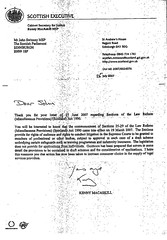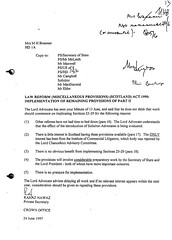The ability to have a McKenzie Friend by your side in an English courtroom should be extended to Scotland after a 39 year unwarranted exclusion, say access to justice campaigners, and the petitioner, Mr Stewart MacKenzie.
Peter Cherbi’s “Diary of Injustice” law blog reveals more on the merits of the McKenzie Friend petition and why having a McKenzie Friend at your side (if you can’t obtain the services of a solicitor) may very well be a good thing for justice and the courts. (Yes, high time McKenzie Friends were recognised and allowed in Scotland’s courts – Ed)
Diary of Injustice reports :
 Law Society 'monopolises' Scots access to court. THIRTY NINE YEARS after laws allowing a 'McKenzie Friend' in the English courts system were introduced to facilitate the public's access to justice by allowing a not necessarily qualified legal individual to assist a person in court, a McKenzie Friend Petition (Petition 1247) has been put to the Scottish Parliament at Holyrood, asking for the implementation of the same privileges of a ‘McKenzie Friend’ to be granted in Scotland, to help many who find it difficult through the current system of legal representation, controlled by the Law Society of Scotland, to secure access to the Scottish Courts.
Law Society 'monopolises' Scots access to court. THIRTY NINE YEARS after laws allowing a 'McKenzie Friend' in the English courts system were introduced to facilitate the public's access to justice by allowing a not necessarily qualified legal individual to assist a person in court, a McKenzie Friend Petition (Petition 1247) has been put to the Scottish Parliament at Holyrood, asking for the implementation of the same privileges of a ‘McKenzie Friend’ to be granted in Scotland, to help many who find it difficult through the current system of legal representation, controlled by the Law Society of Scotland, to secure access to the Scottish Courts.
 McKenzie Friend petition will end 39 years of prejudice against Scots ‘justice rights’ in Court. The petition, brought to the Scottish Parliament by Mr Stewart MacKenzie, calls on the Scottish Parliament to urge the Scottish Government to introduce a McKenzie Friend facility in Scottish courts as a matter of urgency. Mr MacKenzie’s case involving the legal profession became famous, when revelations of secret internal memos documenting a claims fixing policy at the Law Society of Scotland, resulted in a televised confrontation between Mr Swinney & former Law Society Chief Douglas Mill during the Justice 2 Committee's investigation of the now passed into law Legal Profession & Legal Aid (Scotland) Act 2007. The memo-gate scandal eventually toppled Douglas Mill as Law Society Chief Executive in January 2008.
McKenzie Friend petition will end 39 years of prejudice against Scots ‘justice rights’ in Court. The petition, brought to the Scottish Parliament by Mr Stewart MacKenzie, calls on the Scottish Parliament to urge the Scottish Government to introduce a McKenzie Friend facility in Scottish courts as a matter of urgency. Mr MacKenzie’s case involving the legal profession became famous, when revelations of secret internal memos documenting a claims fixing policy at the Law Society of Scotland, resulted in a televised confrontation between Mr Swinney & former Law Society Chief Douglas Mill during the Justice 2 Committee's investigation of the now passed into law Legal Profession & Legal Aid (Scotland) Act 2007. The memo-gate scandal eventually toppled Douglas Mill as Law Society Chief Executive in January 2008.
Mr MacKenzie speaking today to Diary of Injustice said : "I am hopeful the petition will get a good hearing at the Scottish Parliament, and begin the work of ending what is a glaringly prejudicial omission from the public's legal rights & entitlements in Scotland, while people in the rest of the UK have enjoyed and heavily used the right of having a McKenzie Friend accompany them in court hearings for nearly four decades."
 Cabinet Secretary Swinney will be asked to speak to Holyrood committee on the merits of McKenzie Friends. It emerged today, the Scottish Parliament's Petitions Committee has set a 5th of May hearing for the petition, but has not granted Mr MacKenzie the right to give oral evidence, to which the petitioner replied : "Since I am not being allowed to speak on the merits of my own petition, I have asked my MSP, Cabinet Secretary for Finance, John Swinney, to attend the Petition Committee hearing and speak on my behalf, as he has done so with considerable care and attentiveness on previous occasions."
Cabinet Secretary Swinney will be asked to speak to Holyrood committee on the merits of McKenzie Friends. It emerged today, the Scottish Parliament's Petitions Committee has set a 5th of May hearing for the petition, but has not granted Mr MacKenzie the right to give oral evidence, to which the petitioner replied : "Since I am not being allowed to speak on the merits of my own petition, I have asked my MSP, Cabinet Secretary for Finance, John Swinney, to attend the Petition Committee hearing and speak on my behalf, as he has done so with considerable care and attentiveness on previous occasions."
In England & Wales, the concept of a McKenzie Friend has existed for some 39 years, assisting people in court, who find it difficult to obtain legal representation either through cost or other reasons.
The guidance from the President of the Family Division of the courts in England & Wales states : “Where proceedings are held in open court, it is clear from the principles set out in Court of Appeal decisions that a litigant who is not legally represented has the right to have reasonable assistance from a layperson, sometimes called a McKenzie Friend (“MF”).”
A litigant in person wishing to have the help of a MF should be allowed to do so unless the judge is satisfied that fairness and the interests of justice do not so require. The presumption in favour of permitting a MF is a strong one.”
A McKenzie Friend May : • Provide moral support for the litigant • Take notes • Help with case papers • Quietly give advice on: points of law or procedure, issues that the litigant may wish to raise in court, questions the litigant may wish to ask witnesses.
Mr Stewart MacKenzie's 'McKenzie Friend' Petition reads as follows : “39 years after a McKenzie Friend was introduced in the English Courts, we still do not have an equivalent in Scots law. For those who are unable, for whatever reasons, to be represented in court by a solicitor, be it cost or principle, it is unjust, immoral and a breach of their fundamental human right to have a fair hearing with reasonable “equality of arms” as required by Article 6 of the European Convention on Human Rights, to force them to appear in court as a party litigant without the facility of having someone to offer them support and guidance.
As people in Scotland are having their lives ripped apart by having their homes repossessed without the opportunity, as they do in England, to at least have their day in court, it is barbaric and inhuman that this obstinate refusal to ensure that the people of Scotland are not treated in an inferior manner compared with the rest of the United Kingdom when it comes to access to Justice. This is not an attempt to get the Parliament to consider any individual case.”
 Justice Secretary MacAskill criticised over his own failure to reform access to justice. While many of the failures to implement the 1990 access to justice legislation can obviously be pinned on previous Scottish administrations who stood by while the Law Society in effect dictated policies on restricting the individual’s right of access to legal representation and the courts, the current Justice Secretary, Kenny MacAskill, and the Scottish Government have done very little, if anything to improve the lot of members of the public who simply cannot get into court because the legal profession feel it is not in their best interests to allow such cases to go forward.
Justice Secretary MacAskill criticised over his own failure to reform access to justice. While many of the failures to implement the 1990 access to justice legislation can obviously be pinned on previous Scottish administrations who stood by while the Law Society in effect dictated policies on restricting the individual’s right of access to legal representation and the courts, the current Justice Secretary, Kenny MacAskill, and the Scottish Government have done very little, if anything to improve the lot of members of the public who simply cannot get into court because the legal profession feel it is not in their best interests to allow such cases to go forward.
 Justice Secretary’s leaked letter promised cabinet colleague John Swinney that access to justice was happening two years ago. The road to reforming access to justice in Scotland has been a rocky one so far, as almost all attempts to-date of implementing changes allowing the Scots public increased access to justice and the Scottish Courts, have either been thwarted by the legal establishment, or held in political limbo by an exceedingly uncooperative Justice Secretary Kenny MacAskill, who despite promises to Cabinet colleague John Swinney, two years ago in 2007 that change 'was on the way', has in reality made things very difficult for anyone other than solicitors to enter the Scots legal services market to this date and no doubt beyond.
Justice Secretary’s leaked letter promised cabinet colleague John Swinney that access to justice was happening two years ago. The road to reforming access to justice in Scotland has been a rocky one so far, as almost all attempts to-date of implementing changes allowing the Scots public increased access to justice and the Scottish Courts, have either been thwarted by the legal establishment, or held in political limbo by an exceedingly uncooperative Justice Secretary Kenny MacAskill, who despite promises to Cabinet colleague John Swinney, two years ago in 2007 that change 'was on the way', has in reality made things very difficult for anyone other than solicitors to enter the Scots legal services market to this date and no doubt beyond.
 High Court Judge Lord Hardie while serving as Lord Advocate, wanted to repeal Scots access to justice legislation. However, while the prickly thorn of reforming access to justice falls to the current Scottish Government to act upon, the legal establishment’s attitude to counter any reforms to increased access to the Scottish Courts go back years, as I revealed in an earlier report where in 1997, the serving Lord Advocate at the time, Lord Hardie, himself advocated repealing the laws which allowed increased competition in the Scots legal services market, which had actually been kept from the public by an intense campaign ran by the Law Society of Scotland for over seventeen years, seeing Sections 25-29 of the Law Reform (Miscellaneous Provisions) (Scotland) Act 1990 only implemented in March 2007 after public queries and the release of documents through Freedom of Information laws which revealed the secret campaign by senior law figures and civil servants within the Scottish Executive to withhold or repeal the access to justice legislation.
High Court Judge Lord Hardie while serving as Lord Advocate, wanted to repeal Scots access to justice legislation. However, while the prickly thorn of reforming access to justice falls to the current Scottish Government to act upon, the legal establishment’s attitude to counter any reforms to increased access to the Scottish Courts go back years, as I revealed in an earlier report where in 1997, the serving Lord Advocate at the time, Lord Hardie, himself advocated repealing the laws which allowed increased competition in the Scots legal services market, which had actually been kept from the public by an intense campaign ran by the Law Society of Scotland for over seventeen years, seeing Sections 25-29 of the Law Reform (Miscellaneous Provisions) (Scotland) Act 1990 only implemented in March 2007 after public queries and the release of documents through Freedom of Information laws which revealed the secret campaign by senior law figures and civil servants within the Scottish Executive to withhold or repeal the access to justice legislation.
A member of the public whose legal case could have significantly benefited from the use of a McKenzie’s friend said today : “"It is a matter of record that Lord Hardie has consistently denied the Scottish Public any meaningful or proper access to the law by his stubborn obstruction of articles 25-29 [of the Law Reform & Miscellaneous Provisions (Scotland) Act 1990], allowing members of the public to be represented by a third party of their choice.“
He went on : “The deafening silence by every major political party which has accompanied this wicked betrayal of trust indicates their tacit approval of it. Disturbingly, the Scottish Courts have also consistently refused to allow recordings of hearings to be made - a proposal also rejected by the Scottish Parliament.”
Given the lack of willingness on the part of the current Scottish Government to speedily reform the Scots legal services market, leaving many clients out in the cold in terms of legal representation, many Scots caught up in legal difficulties feel with some justification, their rights are being impugned by both the legal profession and the Government simply to protect solicitors long held monopoly over access to justice.
Clearly the Scots public could benefit from the McKenzie Friend facility being applied to Scots Law, and as with other legal reforms long overdue, the Scottish Government should act without delay and reverse the 39 year prejudice against ordinary Scots obtaining access to courts, while our English counterparts have enjoyed the use and privilege of a McKenzie Friend at their side.
I therefore look forward to reporting on and watching how the McKenzie Friend petition progresses through the Scottish Parliament .. as surely the public interest of access to justice comes first over protecting solicitors business markets & profits.
No comments:
Post a Comment